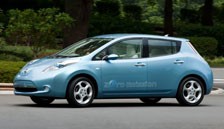Renault and Nissan dealers will have to go back to the classroom before they are allowed to handle new electric cars and light commercial vehicles.
Sales staff and technicians at each outlet are being told they need to win special accreditation before a wide range of zero-emission models starts reaching the showrooms next year.
Work on the tests they will have to pass is nearing completion and training sessions are expected to start early next year before the Renault Kangoo van Z.E. and the Twizy Z.E. two-seater city car - the first commercial EVs from the alliance – arrive in the UK.
"People from all our dealers will have to attend separate training sessions we are designing to help them understand everything about these new vehicles.
“Sales staff will need to be able to describe the functions of the cars. Significantly, they will have to explain to owners that instead of going to conventional filling stations for fuel, they need to have a dedicated domestic supply power socket that conforms to all the safety requirements to charge the batteries.
“We also need to show our technicians how to handle the high-voltage equipment they will have to use and how to repair and maintain our new products. Not everyone at each dealership will need to have this knowledge, but it is essential that we are able to deal with our customers in a professional way,” said Christine Tissot, the executive responsible for the business development of Renault electric vehicles.
Speaking as Renault made a prototype of the Fluence - the Megane-based saloon it will launch in 2012 – available for media testing, she told AM: “A lot of activity is going on behind the scenes with regard to training and in many respects, it’s much like what needs to be done when we introduce any new model.
“While EVs might appear to be just like any other cars, they involve substantial differences and we have to make sure our people are able to fully explain all the topics that relate to them and battery charging in particular.
“Dealers in London, the north east and Milton Keynes – the first three areas in the government’s Plugged-in Places campaign to promote the use of electric vehicles – will be first to be targeted for training, but even dealers who are not particularly interested in EVs will need to know how to handle them,” she said.
According to Tissot, pilot training projects will get under way in Paris in September and 80 per cent of the content will be shared between both alliance partners. However, training in each brand network will be staged independently.
Meanwhile, talks are underway with Renault UK over the cost of introducing EV facilities across the 200-strong network.
“We have to make sure we are fully prepared for this development. We believe that EVs will account for 10 per cent of the car market by 2020 and that by then, they will represent 20 per cent of our business,” she said.













Login to comment
Comments
No comments have been made yet.